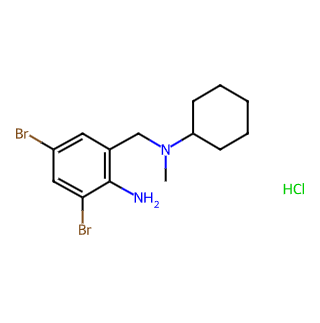- Synthetic anti-infective drugs
- Medications for the digestive system
- Antipyretic and analgesic drugs
- Medications for the blood system
- Medications for the respiratory system
- Anti-allergic drugs
- Medications for the urinary system
- Diagnostic medications
- Immunosuppressive and immunomodulatory drugs
- Vitamins and mineral supplements
- Antioxidants and medications for osteoporosis
- Antiparasitic drugs
- Ophthalmic medications
- Amino acids and their derivatives
- Dermatological medications
- Medications for the circulatory system
- Antitumor drugs
- Medications for the nervous system
- Hormonal and endocrine function-regulating drugs
- Antibiotics
- Others
CAS No.: 611-75-6




Bromhexine Hydrochloride
Bromhexine Hydrochloride is a frequently used medication for the treatment of respiratory diseases.
Basic Information
English Name: Bromhexine Hydrochloride
Molecular Formula: C14H20Br2N2·HCl
Molecular Weight: 412.60
CAS Number: 611-75-6
Pharmacological Effects
Bromhexine Hydrochloride directly acts on bronchial glands, promoting the release of lysosomes from mucus-secreting cells and the breakdown of mucopolysaccharides in mucus. It also inhibits the synthesis of acidic glycoproteins in mucus-secreting cells and goblet cells, leading to the secretion of smaller, less viscous glycoproteins and reducing the viscosity of mucus, making it easier to cough up. Additionally, it stimulates gastric mucosa to reflexively increase the secretion of respiratory glands, diluting mucus.
Clinical Applications
Bromhexine Hydrochloride is mainly used for the treatment of difficult-to-expectorate viscous mucus caused by chronic bronchitis, asthma, etc. It is particularly suitable for patients with difficult-to-expectorate white viscous mucus and critical emergencies caused by extensive obstruction of small bronchi by mucus.
Scientific Research
Apart from its clinical use, Bromhexine Hydrochloride has also been found to have various scientific research values. For example, it is an effective and specific inhibitor of TMPRSS2 protease, which can prevent and control SARS-CoV-2 infection. Additionally, it is an autophagy activator with potential for research on various respiratory diseases.

Tai Yau Street, San Po Kong, Kowloon, Hong Kong, China.



